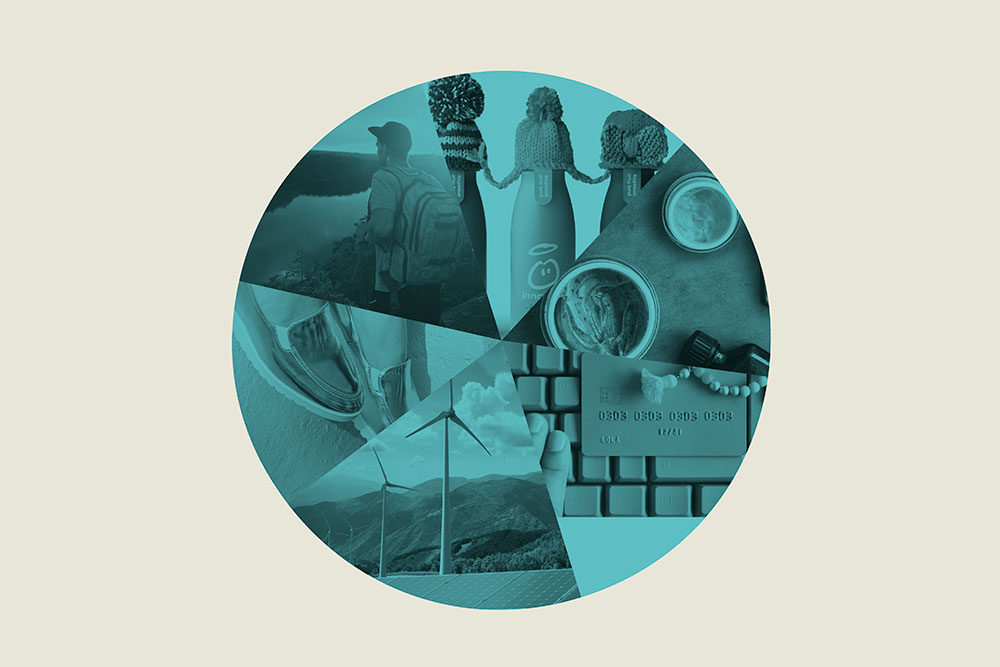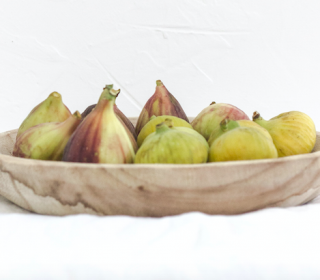Your guide to conscious consumerism

From an anxiety-inducing number of Fairtrade coffees to expensive organic cereals, one glance around your supermarket tells you all you need to know: social responsibility sells. And while Whole Food’s costly peanut butter might induce a solid eye roll, ethical shopping isn’t simply confined to the walls of your local any more. Increasing awareness around issues such as human rights, equal pay and sustainable development, to name a few, has led to a rise in what is known as conscious consumerism.
There’s a movement of people seeking out ways to make positive decisions about what to buy; they’ve got money to spend, but they sure-as-hell want to know where that money is going.
Jukka Aminoff, author of Buying Revolution, explains: ‘The digital world has boosted our consciousness, and everyone has a voice. If the working conditions of a brand are terrible, we’re going to a) be much more aware of it and b) have the power to effortlessly spread the word.
1. FASHION
‘Conscious buying’ has significantly affected change in the world of fast-fashion – namely, shops which offer low-priced, usually low-quality products while also producing huge amounts of waste. This has put real, tangible pressure on brands to become more environmentally sustainable.
A good example is H&M: the Swedish retailer had stated it will use material from entirely recyclable, renewable or sustainable sources. But here’s the rub: it has launched ethical fashion ranges, sure, but was also recently in the news for ‘turning a blind eye’ to toxic factories in which its clothes are made. So, yeah, ethical shopping is even more complicated and difficult than you might think. But there are ways.
The production processes of smaller, locally-sourced brands tend to be more transparent. SZ Blockprints founder Sarah Zellweger, for example, works with local artisan block printers in Jaipur to create one-off printed dresses and scarves. Profits help educate and empower girls and women in India.
From SeaSalt, which manufactures its clothes locally in Guernsey, to leather shoe company Beyond Skin lowering its carbon footprint by using local factories in Spain, this is more than simply a fad.
2. BANKING
Co-op Bank has always been seen as a more principled alternative to other ‘big four’ banks. Its ethical policy prevents the business from investing in arms, fossil fuel extraction and animal testing. But while it may be the most well-known name in this field, it’s certainly not the only one.
Back in April, Dutch bank Triodos, which bills itself as ‘Europe’s leading sustainable bank’, launched its first current account in the UK (they’ve offered ISAs and investments for more than 20 years). It only lends money to organisations and projects ‘making a positive difference to society’.
On the savings front, positive options include Charity Bank and Ecology Building Society. To find out more, check out action group Ethical Consumer, which rates companies based on their record in key areas, such as the environment, human rights and the arms trade.
“The low costs and disposable nature of high street fashion means much of it is destined for incinerators or landfill sites. The UK alone throws away 1 million tonnes of clothing every year.” (Waste Online)
3. FOOD AND DRINK
Are animals being treated well? What is the impact of farming for climate change? The food industry has never been under more pressure from consumers to improve and innovate. One company which is already way ahead is innocent smoothies. Its slogan, ‘Tastes good, does good’, sums up their ethos: buying a smoothie is beneficial not only for you, but for others. The company gives 10% of its profits to charity, its Big Knit campaign (the cute hats? You know the ones) gives 25p from every sale straight to Age UK and it won the Sustainable Business Award last year for its work with Spanish farmers in Spain to reduce water use by up to 40%.
In a similar vein, Pukka, purveyor of high-quality organic tea and supplements, uses its product to make the world a better place too. From sourcing 100% organic to reducing its carbon footprint, ethics is at the ‘very heart’ of the company, says co-founder Tim Westwell – indeed, 1% of its annual turnover goes to environmental causes.
‘Pukka is about people, plants and the planet,’ Tim explains. ‘We are committed to sustainable, ethical practices in everything we do. It isn’t simply about the money – the profit we make goes towards implementing changes in the world.’
It’s even got its eyes on the NHS. ‘The health service is crumbling around us at the moment,’ he explains. ‘Our head of herbal, Ewan, lives in London and works in a GP practice two days a week and doctors are sending people to him. Maybe you don’t always need to take antibiotics?’
4. ENERGY
Last month the UK set a new record in renewable energy: solar, wind, and nuclear power each supplied more electricity than coal and gas combined. This might not mean much to you or I, but with Donald Trump backing out of climate change commitments faster than you can say ‘covfefe’, it’s a (good) sign of things to come.
Although the Big Six (EDF, British Gas, SSE, ScottishPower, E.ON and Npower) still supply about 85% of customers, the number of small companies has exploded.
Ecotricity (Britain’s first green electricity company) and Good Energy have the best tariffs. For socially ethical companies, try Ebico, which charges all customers the same price regardless of how they pay, so doesn’t penalise the poor.
5. TRAVEL
A 2015 report by Tourism Cares found 55% of us volunteered or contributed financially to a destination we had visited in the previous two years. Great – but there are still many people heading off on commercialised package holidays year on year. So what does eco-tourism, or rather the preferred ‘responsible travel’, really mean?
The Center for Responsible Travel (CREST) defines it as something which ‘…aims to minimise tourism’s negative impact on the environment and maximise the positive contributions tourism can make to local communities.’ Simple in theory, but a little trickier to put into practice. And it means much more than just offsetting carbon emissions.
Intrepid Travel runs 1,000 carbon-neutral tours, including one to increase the number of female tour guides in India to 50%. Embedded into its trips are simple but effective features: travellers stay in locally-owned accommodation and, where possible, use public transport. Every time you book one of Responsible Travel’s holidays and opt in, it organises a day trip for a disadvantaged child from a developing country (it aims to fund a million such trips by 2020).
6. BEAUTY
Ethical cosmetics companies were once rare, but these days there is greater demand for morally-made cosmetics than ever. Marcia Kilgore, founder of both Beauty Pie (quality products at totally transparent factory prices) and Soaper Duper (skin and ethically friendly bodycare), says better awareness is the reason ethical buying has taken off now.
‘We’ve all read horror stories about shocking revelations around, mainly, what’s in our food,’ says Marcia. ‘But there’s more and more evidence, too, that, for example, certain ingredients in cosmetic products can lead to endocrine disruption in teenagers. We are eating plastic and wondering why we get sick.’
Isn’t it all just a trend though – companies jumping on the bandwagon to make a fast buck? Marcia says: ‘Certainly for some. And remember it’s difficult, though not impossible, for big companies to suddenly change every material they’re using, but they have to put resources behind it. We started SoaperDuper with a mission to be ‘plastic neutral’, to cut out the usual suspects, to eliminate microbeads, phthalates and artificial colours. And it’s important. If we don’t start shopping with the earth in mind, we’re going to end up living in our own garbage. Nothing comes without a price.’
“Nielsen reports that a third of UK consumers are now concerned about the origin of their products and it’s mainly millennials who refuse to compromise on authenticity and quality.”
Read more: The climate change facts that prove it’s worth fighting for our future
FIND YOUR BALANCE
GO FOR QUALITY, NOT QUANTITY
Do as the French do, and build a wardrobe of classic staples that will last you years. Be prepared to spend more money, opting to buy fewer items of higher quality from brands you’re confident in. Or try secondhand. Charity shops, vintage and online stores like Etsy will leave you with a (fairly) clear conscience.
WHAT DO YOU MEAN BY ETHICAL?
Is it directors’ pay that really gets your back up or dodgy tax dealings? One person’s absolute no-no is another’s shrug of the shoulders, which is why you need to answer these questions before you can sensibly choose. For example, there are many ethical banks and funds to choose from and they’ve all got slightly different criteria.
BE ON THE BALL
Living more consciously is like eating healthily: it’s no good munching on salads for five days then bingeing on junk food for the next two. You need to work on it every day: sign up for a local veg box scheme, eat less, but better quality meat, find a fishmonger and butcher who share your values. Look for beauty products that aren’t over-packaged (90% of the cost of lots of cosmetics, and the landfill left behind, is packaging.)
EDUCATE YOURSELF
Ultimately, if you’re not sure, find out. Don’t believe everything people say – good or bad. Log on to supermarket and brand websites and check out ethical commitments, research well and don’t be afraid to ask questions.








